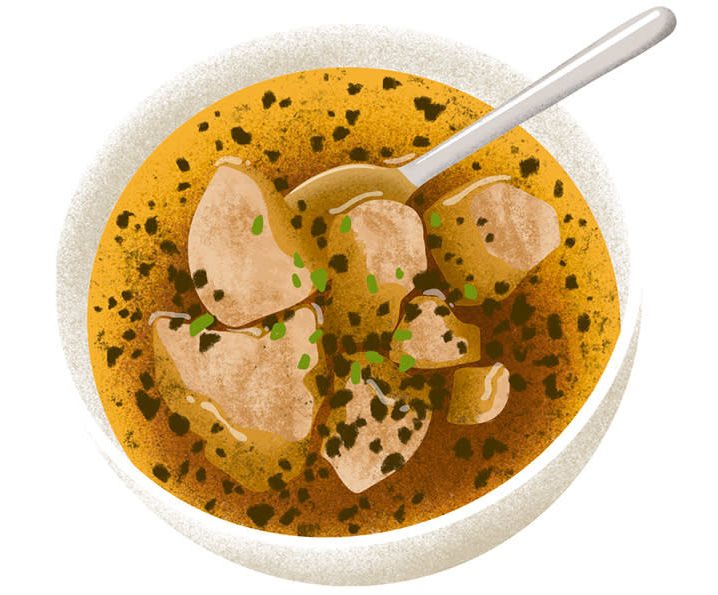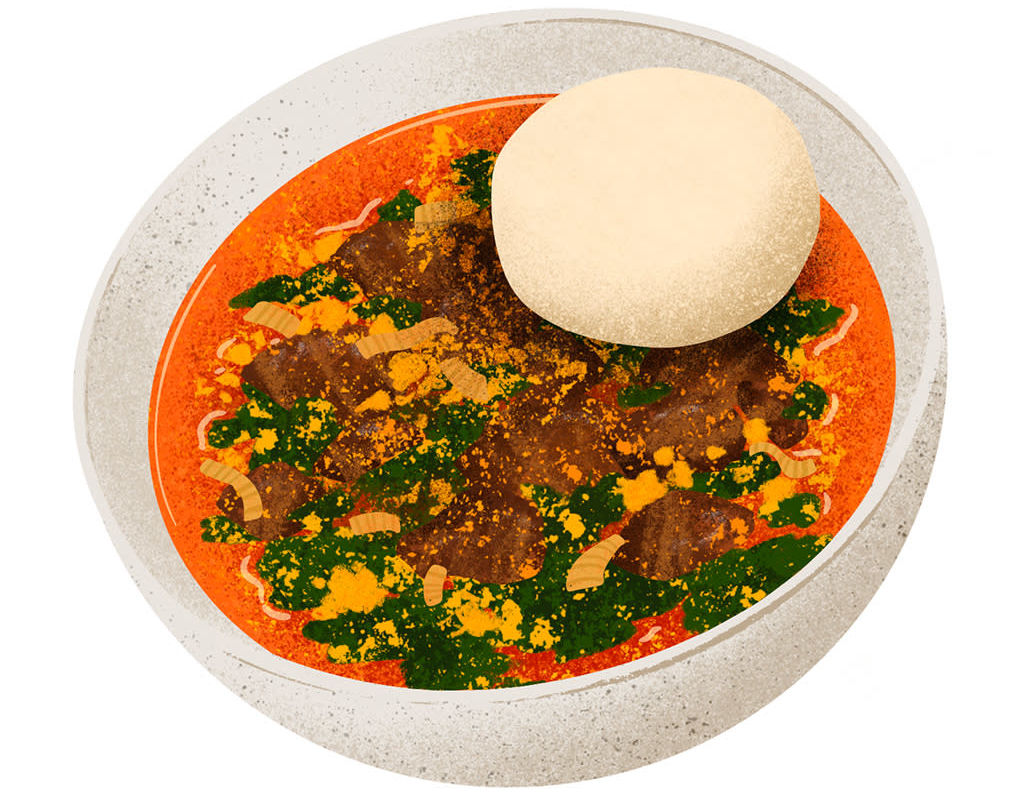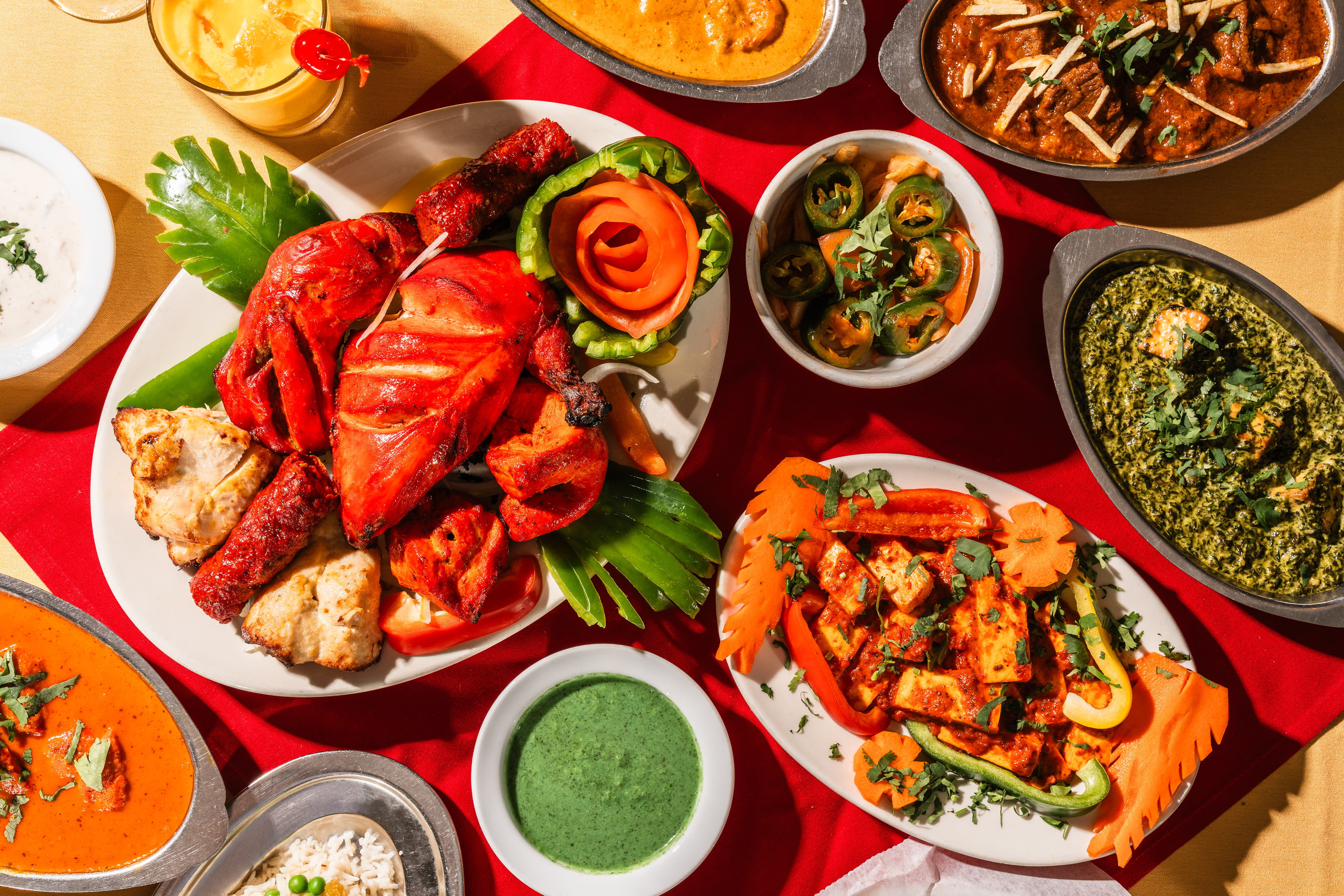Get to Know Nigerian Food in 5 Dishes

If you want to discover the joys of Nigerian food, Houston is the place to be.
Image: Betty Turbo
It would be difficult for anyone who has lived in Houston for a hot minute to be oblivious to the city’s deeply embedded Afro-cultural presence. In particular, the Bayou City is home to the second-largest Nigerian population in the country.
As of 2022, people with Nigerian ancestry number around 60,000 in the metro area, according to the American Community Survey. In this land of cowboy boots and barbecue, the impact and reach of this demographic are highly visible, from the beats of local artists like Tobe Nwigwe to the strides of athletes like Michelle Alozie of the Houston Dash. But let’s be real—one of the most palatable ways this cultural influence touches our lives is through the tantalizing flavors that grace our plates.
Nigerian cuisine is a vibrant tapestry of bold spices, fresh ingredients, and unique cooking techniques. Here’s a glimpse at some of the must-try dishes that define Nigerian food in Houston.

Image: Betty Turbo
1. Jollof Rice
The undisputed king of Nigerian cuisine, jollof rice is a dish that sparks passionate debates and friendly rivalries across West Africa. While its origins can be traced back to the Wolof tribe in Senegal, countries across the continent have their own unique take on this beloved dish.
“Each country in West Africa is very prideful about it, and a lot of times there’s some slight signatures that you can catch,” says Ope Amosu, the chef and owner of Houston-based West African restaurant ChòpnBlọk.
In Houston, jollof reigns supreme at Taste of Nigeria. The Galleria-area restaurant’s version features long-grain rice cooked in a rich tomato-based sauce, infused with a smoky depth thanks to the traditional cooking method.
“Because it is cooked in large portions, you tend to get a lot of char, and some of the flavors from the burnt bits at the bottom start to rise to the top and that’s how you get that smoky signature within the rice,” Amosu explains.
Affectionately called the “party jollof,” this Nigerian dish is a star at communal gatherings. Taste of Nigeria doesn’t shy away from adding a fiery kick with habanero peppers, balancing the savory medley with a delightful spiciness.

Image: Betty Turbo
2. Pepper Soup
The perfect dish for winter or to ward off a cold, pepper soup is a spicy, brothy concoction with woodsy notes. Whether it’s made with catfish, goat, or a mix of meats, the soup is infused with a bold blend of spices and herbs, creating an aromatic symphony that awakens the senses.
“Oftentimes, you’ll see it served in an area called a buka,” Amosu says, referring to small, casual eateries in Nigeria. “It’s very spicy, and it’s going to give you a little bit of a natural smoky flavor that you get from a habanero.”
The broth simmers into an earthy hue, infused with the rich notes of ehuru, also known as African nutmeg. Dry basil leaves offer a fragrant whisper against the base’s bold embrace, while a gentle bitterness peeks through from the woodsy depths of uda seeds.
Don’t let the heat stop you from trying this light and homey dish that feels like a hug in a bowl. At Komchop Restaurant, diners have a choice of a fish-based soup with chunks of succulent catfish or goat meat.

Image: Betty Turbo
3. Suya
Forget subtlety, because when it comes to suya it is all about the intensity. Hailing from the heart of Northern Nigeria, these skewered beauties aren’t for the faint of tongue. Suya uses chopped marinated meat—beef, chicken, or ram—that has been grilled and coated in a one-of-a-kind spice blend called yaji. Made with a potent mix of ground peanuts, ginger, paprika, onion powder, and chile peppers such as cayenne and habanero, the suya spice delivers a complex jolt of heat, smokiness, and earthiness.
Amosu argues that this roadside snack is unlike other types of meat on a stick because of its unique flavor profile. “The earthiness of that peanut pepper spice blend really gives it its own kind of distinct, nutty signature,” Amosu says.
For a taste of suya that’s as legendary as its heat, head straight to Aria Suya Kitchen in Mid West, which takes the snack to new heights. The meat is grilled to perfection and coated in the restaurant’s signature yaji blend, resulting in a juicy, flavorful plate of food. Aria’s suya mix packs a punch that will have you gasping for water (but reaching for another skewer).

Image: Betty Turbo
4. Egusi Soup
A hearty dish that shines brightly in a soup-heavy cuisine, egusi is a prominent item in the Yoruba tribe of Nigeria. Made with melon seeds that are finely ground into a crumbly texture reminiscent of feta cheese, it’s a nutty delight with a complex flavor profile. Dried and ground crayfish, with its intense umami depth, adds a touch of the sea, while chopped leafy greens like spinach weave in pops of freshness.
“It’s a bit pungent and [that] comes from things like the dry crayfish,” Amosu says. “It’s a very bold dish, so you often pair it with more muted elements.”
Komchop Restaurant in west Houston is a great destination for those seeking authentic egusi soup. The joint’s take shies away from being too thick while maintaining its distinctive crumbly texture—a delicious blend of traditional ingredients creating a nuanced flavor profile that will leave you wanting more.

Image: Betty Turbo
5. Peppered Snail
This is not the escargot dish many might know. Forget buttery garlic and parsley—this Nigerian appetizer is an adventurous, fiery delicacy. The most important element of this side is the snails themselves, which are native to Africa and unlike any other.
“These aren’t like the snails you see outside. These snails are, in some cases, about the size of your fist. These are huge snails so it’s a lot of surface for you to enjoy,” Amosu explains, adding that it is his grandmother’s favorite dish.
The snails are first boiled, then sautéed and bathed in a fragrant red sauce made from scotch bonnet peppers and onions. This chewy delicacy is found as a side dish at both 3tees Shawarma restaurants in Alief and Eldridge. The snails here might not be as big as your fist, but it’s worth stopping by to try the spicy dish, which is tempered by the sweetness of caramelized onions, the savory depth of tomato compote, and the earthy undertones of the snails themselves.
Nigerian Cuisine Beyond Tradition
While there are many options for indulging in traditional Nigerian food in Houston, there are also restaurants, like Amosu’s ChòpnBlok, giving the cuisine a unique spin. Currently a counter at the Post Houston food hall, the concept will soon include a brick-and-mortar in Montrose, slated to open this year.
Amosu, who’s lived in various countries across the African continent throughout his life, takes inspiration from his travels and uses his wealth of culinary knowledge to infuse traditional Nigerian dishes with a West African twist and break borders.
“I wanted to represent West Africa as a region because, historically, that’s what it was,” Amosu says. “You had different tribes that kind of roamed all across the coast. It wasn’t until colonization that we started becoming identified as distinctly separate countries. And those borders were essentially put upon us.”
ChòpnBlok’s menu includes everything from jollof rice to curry, Ghanaian steak skewers to Liberian greens. So, whether you’re indulging in the communal feast of jollof rice, savoring the innovative egusi soup or the unique peppered snail, each bite is an invitation to connect and celebrate the flavors of a community that has woven itself into Houston’s fabric.




